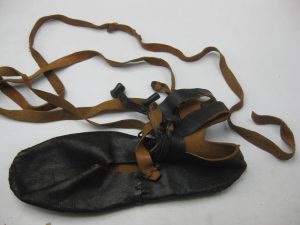The Wonderful World of (Holy) Books
Walking into Mizrahi Bookstore is a lot like stepping into an alternate universe.
For the one thing, time as you know it ceases to exist, surrounded as you are by volumes that date back centuries, in a place where some buyers have been known to linger for hours on end. For another, it is as if you are in the middle of a busy international airport, where foreign languages abound and you find yourself scanning your surroundings for familiar words that you can actually understand. And finally, the 5,000 square foot retail store turns the conventional concept of space on its head, with ceiling high stacks and stacks of books and seemingly endless rows of bookcases occupying practically every available inch.
You have entered the world of used bookseller Israel Mizrahi, the world’s largest used Jewish bookstore. It is a place like no other, which is exactly how the Brooklyn-bred, book obsessed Mizrahi wants it.
Hailing from a Sephardi family with roots that go back to Yerushalayim, Greece, Bulgaria, and Spain, the 32-year-old Mizrahi confessed to having a lifelong love of books. Countless hours of his childhood were spent devouring literary works, and he admitted that while in retrospect it might have been more than a little unusual, he was fascinated by 18th century responsa whose questions and answers provided him with a window to a world gone by, kindling his insatiable appetite for Jewish history. Mizrahi was the only member of his family to be bitten by the literary bug, although both his parents have numerous prolific authors scattered among the branches of their respective family trees.

As Mizrahi became an adult, his passion for books and his personal library grew along with him. Over time he realized that he owned books that he would never open, and when he found himself newly married and with bills to pay, selling off some of those extras seemed like a good idea.
“It sort of happened by mistake,” Mizrahi told The Jewish Echo. “I was offered the library of a friend’s grandfather and I made a few dollars on it. I kept on buying and once you have 10,000 books there is no way to retire. You just end up buying and buying and buying.”
Approximately 10 years ago, the father of four moved the business from his home to its current location on Quentin Road, where three full floors and the rented basement of an adjacent shul overflow with 200,000 books in approximately 50 different languages. Mizrahi is the largest seller of used Jewish books in the world and his stock runs the gamut ranging from the rare to the common and covering a wide array of topics. His collection includes sefarim of every possible kind and from every era, as well as Jewish periodicals, cookbooks, bibliographies and children’s books. The list just goes on and on.
“I collected jubilee volumes of synagogues who published their own histories and I put together a collection of 300 of them and it sold,” said Mizrachi. “Most of those communities don’t even have any Jews living there anymore.”
Another Mizrahi-inspired collection included 1,000 postcards of American synagogues of long ago.
“Every small town in New England had a synagogue,” explained Mizrahi. “Every southern city had a synagogue. None of them are left today. It is a mission to preserve their history.”
Not all of the items that Mizrahi sells are books. His inventory also includes menorahs, mezuzah cases, coins, letters and one of his most recent acquisitions, a shoe used for the mitzvah of chalitza that came from the former offices of Ezras Torah. The handmade shoe, whose body, sole, straps and stitching are crafted entirely from leather obtained from a kosher animal sold quickly, bringing a price of $3,000.
Keeping track of thousands of volumes is no small feat, but Mizrahi takes it in stride. Every book, without exception, gets cataloged from the moment it enters the store. Shelves are marked with numbers and letters, its location entered into Mizrahi’s master database. The system works well for the most part.
“Books generally don’t move on their own,” observed Mizrahi. “The problem is if a customer moves things around. One in maybe every 500 books I can’t find and I can spend an hour looking for a book that someone moved two shelves away.”
Areas of the store that house books that are too expensive to replace are off limits to customers. Other sections are open to visitors but Mizrahi often tags along because once people start guessing where a specific book came from things can get dicey. A sign asks customers to do their best not to preserve the controlled chaos with a heartfelt plea reading, “We beg, we insist, we please, we urge whatever it takes: Please make sure every book gets put back in the shelf it started from. We want to continue to serve you.”
Arranging books by topic might seem logical to some, but the fluid nature of Mizrahi’s inventory precludes that idea.
“Let’s say I have a Holocaust section and I get a library of 5,000 Holocaust books,” said Mizrahi. “I would need more space for those new books and when they sell the space would be wasted.”
With a seemingly random selection of books arranged in an order that appears to an outsider to be completely arbitrary, Mizrahi Bookstore is not the place that you go to browse siddurim.
“It doesn’t look like Eichler’s here in any way,” quipped Mizrahi.

Mizrahi’s typical customer visits the store once a week and most have collections of their own and very specific interests. Like Mizrahi, many eat, sleep and breathe books and they aren’t necessarily looking for something to read over the weekend. They are book people, something Mizrahi describes as a subculture of the Jewish world.
“I have real book addicts who are petrified that someone else will get a book they are looking for,” said Mizrahi. “I have people who have been coming here for 10 years who don’t tell anyone else they are coming because someone might buy a book that they really want. Some of my regulars help me unload my car when I get a delivery so that they can get first crack at the new merchandise.”
Mizrahi estimated that he sells and lists approximately 150 books a day, with half of his business coming from his online store JudaicaUsed.com. He has web customers who monitor the site for new books every half hour, and two who have feeds notifying them whenever an item is listed. Between his store and his site, Mizrahi has approximately 100 people checking his stock daily.
Some of those who have developed a book habit hide their purchases so as not to upset their spouses. There is the man who comes in after doing his pre-Shabbos shopping, slipping his new books in with his groceries so that he can sneak them into the house undetected. There are those who are biding their time for a few more weeks, waiting until their wives go up to the country to bring home their purchases. Mizrahi estimated that he has several boxes of books on hold for customers who fall into that category. And then there are wives who call Mizrahi, hoping he can help surprise their book loving husbands for their upcoming birthdays.
“I even had one guy who got married and made a wish list for his wife of things he wanted from the store,” said Mizrahi
Mizrahi’s day starts early and he is typically in the store before 6 A.M. He utilizes the several hours of quiet time before customers start coming in to pack orders and attend to other business including photographing, cataloging and writing descriptions of his latest acquisitions. He gets offered full libraries of 5,000 to 10,000 books on a regular basis, if for no other reason, because there aren’t too many others willing to buy them. Mizrahi tries to be selective in his purchases to prevent his inventory from mushrooming beyond control and he weeds through libraries immediately upon arrival; books that have potential are brought inside while the remainder never even make it past the front door.
Mizrahi’s stock ranges from lower end items to those that he classifies as “very rare” and he has paid anywhere from $10 to $1 million for full libraries. A book can sit on his shelf for several years before it is sold.
“It’s not that they aren’t great books,” observed Mizrahi. “It’s just that the person who needs it hasn’t found me yet. Every book is individualized and it has to go to the right person.”
The bookstore’s customers run the gamut. Mizrahi works with the Yeshiva University Library and the National Library of Israel, keeping their interests in mind when he buys books. He recently sold 2,000 books to be used as a background in a movie shoot, giving the buyer a good deal while clearing his shelves of unneeded volumes. The combination of his storefront and his web presence give him the ability to serve customers just about everywhere, from all walks of life.
“I have one steady customer in rural Pennsylvania that I send a book to every two or three weeks,” said Mizrahi. “Each time he sends me a postcard thanking me. Another customer in New Mexico told me he had just discovered that he had Marrano roots and wanted to know how to convert.”
His web presence has given Mizrahi the ability to experience cultures and have interactions with people he might have never met under regular circumstances. Conversations with customers in his store have often resulted in more than just book sales.
“A lot of time I have been able to make shidduchim,” said Mizrahi. “A person comes in and tells me they are researching a particular topic and I can direct them to an expert. I have had people writing articles and books and I hooked them up with another customer who was good at editing.”
The cost to own a piece of history can vary greatly. Mizrahi’s oldest book, an Alfas on the Talmud, printed in Venice in 1522, comes with a $4,000 price tag. An 1834 edition of the Leeser Chumash, the first Jewish edition of the Torah printed in the United States, runs $4,500. And if you are in the market for a four page letter, hand written by the Chofetz Chaim, Mizrahi has that too, with a sales price of $22,000.
While Mizrahi’s two year old isn’t quite ready to tackle books just yet, his three oldest are avid readers. He and his wife Rivi encourage their children to read and with a steady supply of books arriving nightly and twice a week visits to the library, there are plenty of pages just waiting to be turned.
“We encourage them to read whatever their heart desires with the hope that their interests mature as they age,” said Mizrahi.
Despite the long hours and the hard work Mizrahi loves what he does. He enjoys spending his days interacting with others who share his interests, oftentimes discovering things that people don’t usually share with the world.
“You could daven next to someone for 50 years and not realize that they are the world’s expert on something like pawn brokering in France,” said Mizrahi. “It is always amazing to realize that a person that you thought you knew has hidden interests.”
Sandy Eller is a freelance writer who writes for numerous websites, newspapers, magazines and many private clients. She can be contacted at sandyeller1@gmail.com.
You must be logged in to post a comment.